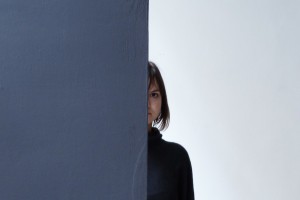October 10, 2018
By Cristina Bogdan
Survival Kit
The Riga-based festival Survival Kit, now at its 10th edition, is an art event with several important stakes. Born as a response to the 2008 economic crisis, it aimed to occupy run-down public buildings with art, and lobby for their reinsertion into the city fabric. They were to become critical spaces in a context where debate is not the weapon of choice when handling thorny situations. Living in Bucharest myself, I was not surprised to learn that Riga sparks foreign imagination mostly as a stag party venue, whilst locally the main source of public commentary is the identity question – so perfectly aligned to the recent trend in Eastern Europe of growing nationalism, ethnicisism and long time running self-colonization. Speakers during the 3-day festival pointed out several times the relevance of the critical space opened up by Survival Kit, mentioning on all occasions that it was an exception more than the rule.
Taking things further, Survival Kit was eager to bring to the table questions from outside the narrow frame of reference of identity and nationalism. By introducing global topics to Latvia, such as immigration, planetary ecology, gender equality, periphery & outlandness, by contextualizing them properly via talks & visual works, the curators were aiming to also give Latvia a voice in the current debates surrounding these questions. As a corollary, distant topics (in a geographical sense, but also in the sense that they are very general or abstract) permit complicated topics on the local scene to be introduced in a less aggressive and subtler way.
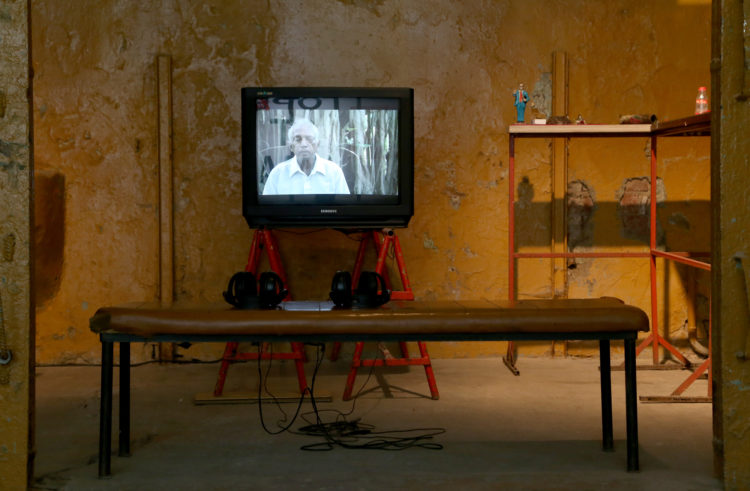
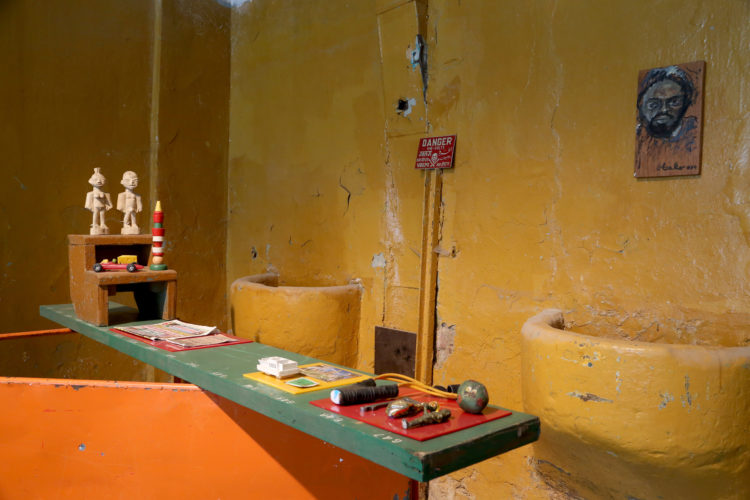
Janek Simon. Adventures of Mister Seven, 2013. Photo: Margarita Ogoļceva, Latvian Centre for Contemporary Art, 2018. Single-channel HD video and collection of found objects; dimensions variable, length 88′ 13″.
This was immediately visible in the choice to invite two foreign curators alongside the two Latvian ones. Sumesh Sharma is a Bombay-based curator whose work I was not familiar with prior to this project – it is therefore difficult for me to situate him artistically or politically. Nonetheless, he invited my top 3 artist picks of the festival: Polish artist Janek Simon, Estonian performer Kristina Norman and French artist Kader Attia. I would say Janek Simon stands as a great example of what Survival Kit aimed to be: his work stems from his journeys in Asia and Africa for over 15 years, mixing references and perspectives with the subtle humor of the outsider as peer. I have been looking for such ease and curiosity on the Romanian scene ever since I returned to work here, as it is my belief that looking at other contexts than the western one remains the only route to rebuilding our political imagination. So I was pleased to find that in Riga there are people who also confront this frustrating question of the eternal misery of catching-up and aim to undo the deadlock we were pushed towards from the outside as well as from within. In this respect, Survival Kit seemed to me to be asking the right questions. Barcelona-based curator Ángels Miralda also contributed to enriching the picture. She is a friend and collaborator whose work I have been following for a long time. I can therefore detect her touch in the subtle us of the venue – an abandoned circus scheduled for renovation, also in terms of the approach to using animals in the shows. Ángels presented works from artists such as Cibelle Cavali Bastos, who imagined a post-gender future as a performative insert in the corridors of the circus.
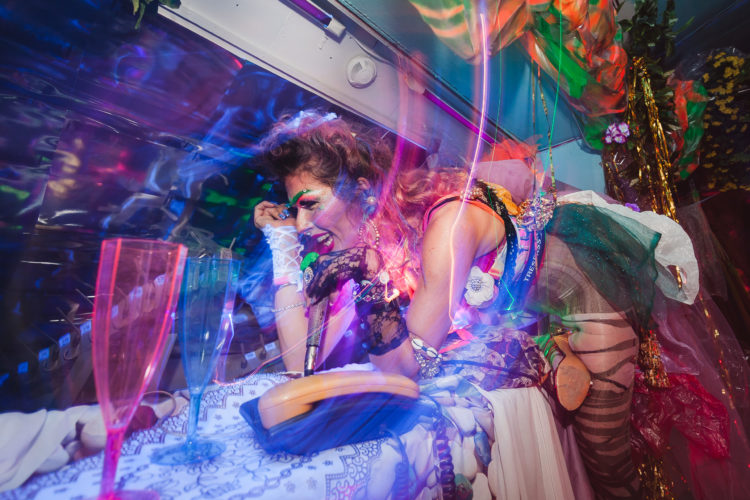
Cibelle Cavalli Bastos, Las Venus Resort Hotel: Chill Out Dimensional Fold Download, 2018 Photo: Margarita Ogoļceva, Latvian Centre for Contemporary Art, 2018. Installation, found materials; dimensions variable.
The two Latvian curators, Solvita Krese and Inga Lāce, are important members of the Latvian Centre for Contemporary Art (LCCA), the institution organizing Survival Kit. There is something to be said about LCCA. Heir to one of those compulsory Soros centers in the Eastern countries post-89, LCCA managed to keep up its mission of researching and archiving the contemporary art scene, whilst fueling debate, training professionals and promoting the scene abroad. Its vision evolved from the catching-up framework to a more critical approach to the contemporary. The actions of LCCA are durational and low-key, the kind of work that does not dwell in hashtags, nor does it take provocative and sensationalist positions in an already fragile context. A discrete presence on the international scene, it is nevertheless the reference when it comes to Latvian contemporary art.
I made this presentation not just to inform, but as a means of introducing the disruptive element in regard to this year’s edition of Survival Kit: the first edition of RIBOCA, the Riga Biennial founded by Agniya Mirgorodskaya, paid by Russian money, curated by Katerina Gregos and taking place between June and October 2018. ‘Festival’ is perhaps the most neutral, or the least ‘contemporary art’ description of an event. A biennial, on the other hand, is a clear alignment with capital. Flipping through some of the takes on RIBOCA, I was not surprised to read how it injects capital into a ‘dilapidated city’ and aims to revive interest in a city heavily hit by the financial crisis (see the Financial Times review). The discourse of the biennial as successful foreign investment may sound cringy, but the artworld never fails to validate serious and well-installed works brought together by an all-encompassing and if possible poetic title. Everything was forever, until it was no more – and between the extremes of being and non-being, lies capital: eternal, uncritical, a- and anti-political.
Throughout its 8 venues, the biennial reads as a display of force and of buzzwords that don’t have the time to sink into the local imaginary. No risks taken – here, themes that Survival Kit put forward in order to contextualize local preoccupations, simply follow one another, flattened by scale and good design. In various interviews accompanying the biennial (such as this one), the curator underlines her engagement with the context – but I choose to understand this engagement differently. The point is not just to show local or regional artists, cherry picked after months of research and studio visits. Engagement means taking the time to go beyond the big themes and make room for idiosyncrasies that may be unpopular or outdated. Not aim for a presentation of everything you wanted to hear the local artists say, but allow for the uncomfortable voice of difference to be heard. It’s not that a foreign curator cannot do that – insight isn’t an equivalent to inside. My disbelief rather comes from repetition that does not become difference: art as anti-politics, shedding responsibility and covering up for the libertarian discourse of the ‘artworld’ that always bleeds into politics.
Survival Kit reads outside of the collision with RIBOCA, because it has a history, a meaning and a purpose. However, its existence becomes a statement in itself when faced with the idea that Riga was put on the map by the newly created biennial. Some may be excited by the perspective, but this always comes at a cost: whatever specific position may emerge from the scene, it is muted and denied political value. In the long run, political imagination stalls and it becomes very easy to forget just where resistance is located.
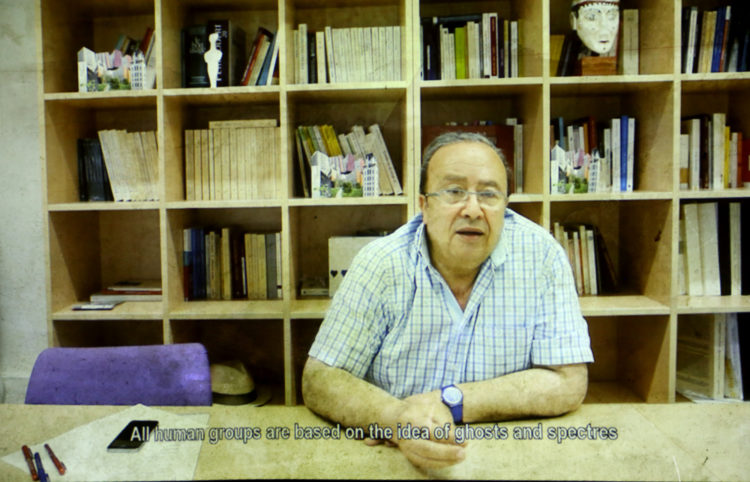
Kader Attia. Reflecting Memory, 2016. Photo: Margarita Ogoļceva, Latvian Centre for Contemporary Art, 2018. HD video, 48′, installation in collaboration with Vladimirs Jakušonoks; installation dimensions variable.
Contemporary Art Festival SURVIVAL KIT 10 takes place in two parts. Part One was in the Building of the Riga Circus between 06.09.18 – 30.09.18.
In the writing of this article, I am indebted to Ana Teixeira Pinto’s thoughts on the growing trend of anti-politics, as discussed in her presentation for ODD THEORY #8 which took place in Bucharest on September 15th.
POSTED BY
Cristina Bogdan
Founder and editor-in-chief, between 2014-19, of the online edition of Revista ARTA. Co-founder of East Art Mags, a network of contemporary art magazines from eastern and Central Europe. Runs ODD, a s...
www.evenweb.org


